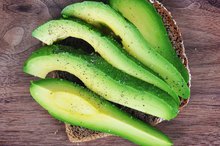What does fact checked mean?
At Healthfully, we strive to deliver objective content that is accurate and up-to-date. Our team periodically reviews articles in order to ensure content quality. The sources cited below consist of evidence from peer-reviewed journals, prominent medical organizations, academic associations, and government data.
- MedlinePlus: Blue-Green Algae
- International Journal of Molecular Sciences: Biosynthetic Pathway and Health Benefits of Fucoxanthin, an Algae-Specific Xanthophyll in Brown Seaweeds
- International Journal of Molecular Sciences: Biosynthetic Pathway and Health Benefits of Fucoxanthin, an Algae-Specific Xanthophyll in Brown Seaweeds
- Journal of Medicinal Food: Health Benefits of Blue-Green Algae: Prevention of Cardiovascular Disease and Nonalcoholic Fatty Liver Disease
- Journal of Medicinal Food: Health Benefits of Blue-Green Algae: Prevention of Cardiovascular Disease and Nonalcoholic Fatty Liver Disease
- Advances in Food and Nutrition Research: Biological Activities and Potential Health Benefits of Fucoxanthin Derived From Marine Brown Algae
- Advances in Food and Nutrition Research: Biological Activities and Potential Health Benefits of Fucoxanthin Derived From Marine Brown Algae
The information contained on this site is for informational purposes only, and should not be used as a substitute for the advice of a professional health care provider. Please check with the appropriate physician regarding health questions and concerns. Although we strive to deliver accurate and up-to-date information, no guarantee to that effect is made.
The Advantages & Disadvantages of Algae
Algae refers to a variety of plantlike organisms that live in water, including the blue-green algae spirulina, seaweeds like kelp and wakame, and brown algae like laminaria, or kombu 38. These sea vegetables provide some essential nutrients and may have some health benefits, but there are also some potential risks, especially if you consume them in large amounts.
Nutrient Content
Different types of algae offer slightly different nutritional value. Dried algae is a more concentrated source of nutrients, as raw algae is about 80 percent water, compared to less than 5 percent water in dried algae. Algae may even help fight malnutrition, according to a July 2010 article on the United Nations Food and Agriculture Organization website. The algae spirulina provides the beta carotene, iron and protein that are often lacking in some people's diets.
- Different types of algae offer slightly different nutritional value.
- The algae spirulina provides the beta carotene, iron and protein that are often lacking in some people's diets.
Potential Health Benefits
Side Effects of Limu
Learn More
It may also have a protective effect on your neurons and your brain, notes another review article published in Advances in Food and Nutrition Research in 2011.
This research is still preliminary, however, and further studies are necessary to verify any potential benefits of algae.
Potential Side Effects
Some people may be allergic to algae and experience the symptoms of an allergic reaction, such as rash, difficulty breathing, swelling and anaphylaxis. Other potential side effects include goiter, skin reactions and gastrointestinal effects. Some types of dried seaweed are high in iodine, which could cause an increase in the amount of thyroid-stimulating hormone in your body and give your skin a yellow tint or cause a skin outbreak that looks like acne if you consume them in large amounts. Pregnant women should avoid the brown algae laminaria, as it may dilate the cervix, resulting in preterm labor 8.
- Some people may be allergic to algae and experience the symptoms of an allergic reaction, such as rash, difficulty breathing, swelling and anaphylaxis.
Other Considerations and Risks
Laminaria Extract & Weight Loss
Learn More
Contaminated products may cause thirst, vomiting, nausea and stomach pain. Some types of algae are toxic and could cause:
- numbness
- weakness
- diarrhea
- nausea
- tingling
- death
Related Articles
References
- University of Maryland Medical Center: Spirulina
- Memorial Sloan Kettering Cancer Center: Blue-Green Algae
- MedlinePlus: Blue-Green Algae
- International Journal of Molecular Sciences: Biosynthetic Pathway and Health Benefits of Fucoxanthin, an Algae-Specific Xanthophyll in Brown Seaweeds
- Journal of Medicinal Food: Health Benefits of Blue-Green Algae: Prevention of Cardiovascular Disease and Nonalcoholic Fatty Liver Disease
- Advances in Food and Nutrition Research: Biological Activities and Potential Health Benefits of Fucoxanthin Derived From Marine Brown Algae
- Drugs.com: Seaweed
- Drugs.com: Laminaria
- American Cancer Society: Sea Vegetables
Writer Bio
Based in Massachusetts, Jessica Bruso has been writing since 2008. She holds a master of science degree in food policy and applied nutrition and a bachelor of arts degree in international relations, both from Tufts University.









